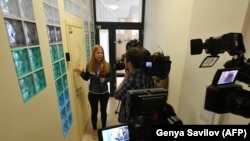Ukraine's detention of Russian state journalist for 'treason' prompts concern
| Publisher | Radio Free Europe/Radio Liberty |
| Publication Date | 16 May 2018 |
| Cite as | Radio Free Europe/Radio Liberty, Ukraine's detention of Russian state journalist for 'treason' prompts concern, 16 May 2018, available at: https://www.refworld.org/docid/5b20de423.html [accessed 1 June 2023] |
| Disclaimer | This is not a UNHCR publication. UNHCR is not responsible for, nor does it necessarily endorse, its content. Any views expressed are solely those of the author or publisher and do not necessarily reflect those of UNHCR, the United Nations or its Member States. |
Last Updated: May 16, 2018 03:16 GMT
By RFE/RL's Ukrainian Service
 Ukrainian journalists outside the closed door of the Kyiv office of Russia's state-run RIA Novosti news agency on May 15.
Ukrainian journalists outside the closed door of the Kyiv office of Russia's state-run RIA Novosti news agency on May 15.
KYIV – Ukrainian Security Service (SBU) officers have searched the office of Russian state news agency RIA Novosti's branch in Ukraine and detained a journalist on "treason" charges, prompting outrage from Russia and concern from Western officials.
The law enforcement actions on May 15 drew a swift and angry response from Russia, with President Vladimir Putin's spokesman saying journalist Kirill Vyshinky's detention was "disgraceful and scandalous" if it was related to his work.
Colleagues at RIA Novosti-Ukraina said that Vyshinsky, a Russian citizen, was detained near his home in Kyiv.
A representative of the Kyiv-controlled Prosecutor-General's Office of Crimea, Ihor Ponochovnyy, told journalists that Vyshinsky was preliminarily charged with "treason," a crime that carries a prison term of up to 15 years if he is convicted.
SBU deputy chief Viktor Kononenko told journalists that Vyshinsky, who has dual Russian-Ukrainian citizenship, received financial support from Russia via other media companies registered in Ukraine in order to disguise ties and cooperation of RIA Novosti's branch in Kyiv with the Russia Today state media company in Russia.
According to Kononenko, Vyshinsky was in Crimea in spring 2014 during Russia's annexation of the peninsula, where he and journalists under his supervision prepared materials "justifying" Moscow's move to seize the Ukrainian territory.
"Exactly for those activities, Russian President Vladimir Putin awarded Vyshinsky with the 'For Returning Crimea' medal," Kononenko said, adding that Vyshinsky had received up to 100,000 euros ($120,000) monthly from Russia for his pro-Moscow "propaganda materials" supporting Russia-backed separatists in Ukraine's east.
SBU spokeswoman Olena Hitlyanska wrote earlier on Facebook that the news agency's office in the Ukrainian capital was searched.
Hitlyanska wrote that the SBU and prosecutors had "uncovered the activities" of a Russian-controlled network of media outlets that has been "used by the aggressor country to conduct a hybrid information war against Ukraine."
She said that more details would be made public later.
Ties between Moscow and Kyiv have been severely damaged by Russia's seizure of Crimea in 2014 and its support for separatists in a war that has killed more than 10,300 people in eastern Ukraine.
The Ukrainian government is wary of Russian media and entertainment, accusing Moscow of distributing disinformation aimed at sowing tension and destabilizing the country.
Kyiv has banned more than a dozen Russian television channels since 2014, accusing them of spreading propaganda.
Putin's spokesman, Dmitry Peskov, said that the SBU's actions "contradict all norms and rules" and "deserve the harshest condemnation from international organizations."
Foreign Minister Sergei Lavrov said that Russia was awaiting "a principled announcement" from the Organization for Security and Cooperation in Europe's (OSCE) media-freedom representative.
Lavrov said it was "far from the first time" that the Ukrainian authorities had "restricted the activities" of Russian journalists in Ukraine.
In Vienna later on May 15, the OSCE representative on freedom of the media raised "serious concern" over the raid, and called on Ukrainian authorities to "refrain from imposing unnecessary limitations on the work of foreign journalists."
"The fight against propaganda must not fall short of international standards and should not represent disproportionate interference in media activities," Harlem Desir said in a statement.
In Washington, U.S. State Department spokeswoman Heather Nauert said the United States shared Ukraine's concern about Russian propaganda, but said that Ukraine must ensure it abides by the law, including international human rights law.
Ukraine drew criticism from media freedom advocates in 2017 for the deportation of a correspondent for Russia's state-run Channel One television.
With reporting by RIA Novosti, UNIAN, TASS, AFP, AP, and Ukrayinska Pravda
Link to original story on RFE/RL website
